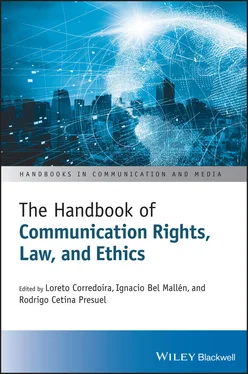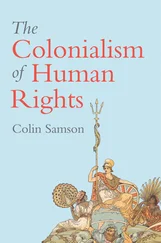1 ...6 7 8 10 11 12 ...29 Clearly, this situation had negative consequences on the consolidation of all rights, including communication rights. The idea that human rights are a positive and complementary consequence of the exercise of human freedom is incorrect. Freedom per se is a way to exercise rights, and it neither precedes nor follows from rights. Rather, freedom is an attribute of rights. No right can be exercised without freedom. And there is an even more important idea at work: human rights, which allow humankind to fulfill its existential needs, precede the existence of states and are rooted in the human condition itself. Rights are innate to humans: they are born with a person and belong entirely to that person until the moment of their death.
From Freedom of Expression to Communication Rights
The true sense of freedom can be understood when we consider it as a form in which a right is exercised – in this case, communication rights and their three facets (seek, receive, and impart) as these are analyzed in this work. In this way, the exercise of liberty can be understood perfectly as a way to facilitate the development of human rights, since rights cannot be exercised without freedom. The two concepts represent two sides of the same coin, though there is a substantial difference between them. Freedoms, particularly public ones such as freedom of expression or freedom to join a union or political party, are innate to man, yet they are regulated by the state by virtue of its authority to establish the extent of the freedom defined in its laws and regulations. From this perspective, freedom is a concession from the state, which becomes more democratic when it concedes more freedom, but which always retains the possibility of limiting freedom in the name of the so-called public good in order to protect other assets. This is the case, for example, with official and judicial secrets as well as with regulation of telecommunications.
In contrast to freedom, human rights are not conceded by the state nor do they have their origins in the state. They fall under the authority of humankind and are innate to it; they are born together with the individual and accompany that individual throughout their life. The role of the state is to recognize human rights in this way and protect the ability of individuals to exercise those rights. The exercise of human rights requires freedom, which must be conceded by the state in sufficient measure to allow a meaningful exercise of those rights. This is the double task of the state: to recognize rights and to guarantee their free exercise.
If society struggled initially to achieve desired levels of freedom, the struggle today is to make states recognize the rights of their people and protect the exercise of those rights. It is, and will remain, a difficult struggle, just as it was difficult to win freedom. Without a doubt, the day will come when eventually all rights will be recognized everywhere in the world. Communication, particularly information and communication technologies, has a role to play in achieving this objective; it serves as a reference point for people lacking, completely or partially, the human rights that are innate to them.
Freedom of Expression Lies at the Foundation of Communication Rights
Understanding this idea requires an understanding of the true concept of freedom; otherwise we will find ourselves with so-called frustrated freedom. Freedom, historically the fruit of constitutional revolutionary conflict, was granted by the state, which as lord and master of that concession also established the mechanisms of its development. In the event that the state does not follow those mechanisms, it assumes the authority to limit or even suspend that freedom. Freedom in this case is “given” or “granted” and does not have the status of a citizen’s right. Rather, it is a prerogative of the state.
Under these circumstances, which are extreme but unfortunately common, freedom can become illusory or at least uncertain, regardless of how explicitly it is enshrined in a constitution. The cause of this situation – and, paradoxically, the solution – is that humans cannot be the victim of a continuous fraud. As a result, people tend to rebel against a lack of freedom. People’s yearning for freedom, which is real, makes them fight constantly, since, in the words of Desantes (Desntes Guanter 1974, p. 28):
The rights of people to achieve their existential aims are equivalent to the aims themselves, which precede the state and are rooted more deeply than the state…. [Similar to] the condition of being attributable to human personality … freedom can be saved only when it considers itself to be what it really is: the emanation of a right, or one of the forms of exercising a right.
This is the true meaning of freedom, which is constituted as the essential foundation for exercising any right. But freedom is an attribute, not a foundation. The foundation is the right, and direct exercise of a right requires freedom. This clearly explains why the fight for freedom has been at the core of history and how it has been possible to obtain the communication rights. Thus, since 1948 we have not spoken of a freedom of expression arising out of the will of the state, but rather of a fundamental human right that exists in people purely because of their existence. This human right is enshrined in Article 19 of the UDHR.
The Long and Difficult Road to Communication Rights
On December 10, 1948, over 70 years ago, the UDHR was approved in Paris under the auspices of the United Nations (UN). It is no exaggeration to consider this date epic in the history of human beings because it ended an extremely long stage of widespread fighting and conflict that initially had simple freedom as its goal but later sought the state’s recognition of individual rights. This date marked a “before” and “after” in the history of humankind and its consolidation as a holder of natural rights (see Suksi et al. 2015).
The UDHR ended a process that, if we restrict ourselves only to the most recent centuries, began in 1628 when the Magna Carta Libertatum was written in English, or even in 1215, when the Magna Carta was approved by King John of England (Sánchez Ferriz and Corredoira 2017). The Magna Carta was followed by the Petition of Right (1628). This petition is considered by many historians 2as the first great political declaration of rights. Its 11 articles aimed to guarantee not only principles of political freedom but also those of individual freedoms. For example, it forbids arbitrary detention and extraordinary courts, and it guarantees the right of the accused to due process and to respect their rights as these are recognized in the kingdom’s laws and statutes.
Here, it is also appropriate to mention, for its indirect influence, the implementation of the Habeas Corpus Act (1679) for accused and imprisoned individuals, which aimed to protect the individual, prevent their arbitrary transfer, and guarantee compensation for damages arising from illegal transgressions of their rights. This document made transgressors legally responsible for their actions and established fines and penalties.
The Petition of Right lasted barely two years. Then in 1689, the Bill of Rights was signed which, for the first time in history, expressed the principle that the king’s authority does not have the force of law and that the law is above the king. It also recognized the public’s right to petition and the right to vote freely, and it established judicial guarantees and the protection of public freedoms.
This declaration was followed by others in Europe and North America. In North America came the Virginia Declaration (1776), the US Declaration of Independence (1776), and the US Constitution (1787). The Virginia Declaration comprises 16 articles that establish a series of rights that, because of their content and language, seem to be precursors of what we understand today as human rights. The declaration considers individual rights to be natural and inalienable – a historical first.
Читать дальше












